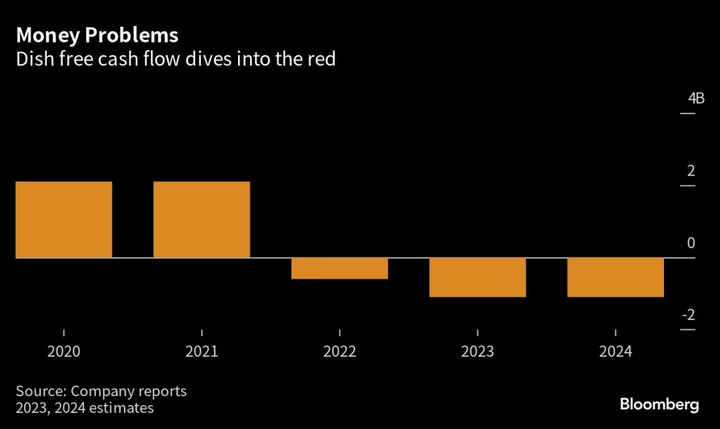Since going all-in on Bitcoin over a decade ago, Tyler and Cameron Winklevoss have had their share of ups and downs. But these days, issues around the billionaire twins’ Gemini crypto exchange just seem to keep piling up.
The SEC is suing Gemini as regulators crack down on the industry. The exchange’s market share has shrunk versus rivals even as crypto prices have rebounded. A banking partner wants to break up. And now this month, a crucial due date on a loan — that, if repaid by its bankrupt lending partner's parent company, could help hundreds of thousands of Gemini customers recoup some of the $900 million worth of crypto deposits trapped in its defunct Earn product — has come and gone as negotiations on a resolution drag on.
Even their ambitious push into the lucrative business of crypto derivatives trading outside the US announced in April faces competition from heavyweights like Binance that have dominated for years, as well as its own regulatory challenges.
Taken together, the developments paint a picture of a company at a crossroads.
Of course, the “crypto winter” hurt just about everyone in the industry and toppled a host of onetime industry leaders, most famously FTX and Celsius. The Winklevoss brothers remain committed to Gemini, have a well-known name and earned bona fides as OG Bitcoiners that carry substantial weight. After a steep drop-off, trading activity — a key source of revenue for platforms like Gemini — has modestly recovered. Importantly, they have the Bitcoin billions to back their company whenever needed.
The recent reversals, however, have been a blow to the twins’ ambitions. That’s because, unlike most other crypto firms, Gemini’s business model has rested on the idea that trust, security and regulation could win over ordinary investors. Now, the pivot abroad is arguably the clearest sign yet of a company trying to stay relevant after losing money, goodwill and employees.
“Its small market share and raft of regulatory troubles portend a bleak future for Gemini,” said Eswar Prasad, a professor at Cornell University and author of The Future of Money: How the Digital Revolution Is Transforming Currencies and Finance. That, and the skepticism of retail investors burned by crypto, could “make it difficult for an exchange like Gemini to find a suitable niche.”
Read More: Gemini Users Are Fed Up. One Is Taking On the Winklevoss Twins
At least a dozen people familiar with Gemini’s business, including current investors, former employees and industry experts, spoke to Bloomberg News. Those who asked not to be identified did so in order to speak candidly about private information pertaining to the company’s operations or finances. The twins declined interview requests for this article.
Charles Harder, a lawyer for the Winklevosses and Gemini Trust, said in letters to Bloomberg News that the brothers “remain fully committed to Gemini” and that “their goal is to focus on running their business and fulfilling their mission.”
The brothers, for their part, seem as optimistic as ever. Earlier this month, they attended the Bitcoin 2023 conference in Miami, and in the days leading up to it, met with the firm’s senior leaders to map out Gemini’s future. “Excited to share the outcomes of these productive days with you soon,” tweeted Cameron. “Couldn't be more bullish on the future. Onward!”
Last week, they were spotted in London, following other US crypto executives who have recently gone on charm offensives abroad in part to counter the US crackdown. There, they met with regulators and talked up a possible second headquarters in the UK.
“We’re not leaving the US, we’re going to continue to fight the good fight there,” Cameron said in an article in the Telegraph last week. “But we also understand that you can vote with your feet, and that’s our right and we will do that when faced with a hostile environment.” The twins next went to Ireland, where they announced on Thursday that Dublin would become Gemini’s new European base.
Like many crypto enthusiasts, the 41-year-old brothers — who famously accused Mark Zuckerberg of stealing their idea for Facebook and then made a fortune as early Bitcoin investors — can also exude a somewhat geeky evangelism. Crypto will disrupt traditional finance, transform the way we understand the world, remake society, etc. And the twins are really into the space thing: One of its main corporate entities is known as the Gemini Space Station, while the company's employees are known as “astronauts.”
In many ways, Gemini’s setbacks echo a broader reassessment of crypto over the past 18 months, resurfacing questions of whether the industry is good for anything other than rampant speculation and, in some instances, scams. It’s also a cruel irony that Gemini’s long embrace of regulation — from a PR blitz declaring “The Revolution Needs Rules” to being one of only a small number of crypto firms to obtain a New York trust charter — could make it much more challenging to run a crypto exchange in the US.
Of course, Gemini might be better off staking its future overseas. The firm recently launched a derivatives exchange, Gemini Foundation, in a number of jurisdictions outside of the US, UK and European Union. It also announced plans to set up an engineering hub in India. Derivatives trading accounted for nearly 78% of the total crypto market last month, according to a report from CCData.
Meanwhile, prices of cryptocurrencies such as Bitcoin have rebounded this year, a tentative sign the worst for the industry might be over.
“The company is plugging along and will rise and fall with the tides of Bitcoin, but mostly rise as the economy moves in that direction,” said Tim Draper, the billionaire venture capitalist who is an investor in Gemini. He added the recent bank turmoil will make Bitcoin even more attractive vis-à-vis banks, and benefit crypto trading firms like Gemini.
Then, there’s the Winklevoss name and the twins’ deep pockets. With personal fortunes of $3.2 billion each, according to Bloomberg calculations, the brothers are capable of self-funding Gemini — as they did in recent months during crypto’s darkest days.
Will their commitment to Gemini pay off?
Digital-asset exchanges rely largely on trading fees, so the more volume a trading platform can attract, the better. Trading on Gemini fell 46% in the January-April period compared with the September-December period, which was among the steepest declines, according to Kaiko, a provider of cryptocurrency market data. The decrease was almost six times the drop on Coinbase, the data showed.
It also faces an uphill climb to regain market share. In April, roughly $747 million in crypto changed hands on Gemini, according to CCData. That amounted to 0.12% of global spot volume last month. That’s up from February, when Gemini’s share hit a low of 0.07%. Yet April’s figure is still almost half what it was a year ago and down from nearly 5% in 2017. And it compares unfavorably with many of Gemini’s rivals including Coinbase and Kraken, which each saw their market share increase in April from a year earlier, the data show. Meanwhile, Binance, the world’s biggest crypto exchange, has seen its share climb to 46% of global volume from 31% a year ago.
The Winklevosses lent Gemini $100 million in recent months to fund operations after they put out feelers about raising fresh capital without coming to any agreements, said two people familiar with the situation.
Harder, the twins’ lawyer, said the company didn’t seek financing and the decision by the twins to lend Gemini money wasn’t because it couldn’t obtain outside funding. He also told Bloomberg that no attempt was made to raise external funds, and that materials typically required to raise external funds, including a pitch deck and term sheets, do not exist.
At the height of the crypto boom in November 2021, Gemini raised $400 million at a valuation of $7.1 billion.
This year, JPMorgan Chase & Co. told Gemini to find another bank partner because supporting it became unprofitable, according to a person familiar with the matter. Harder said the statement is false and “Gemini’s relationship with JPMorgan remains intact.” A JPMorgan spokesman declined to comment.
Gemini’s workforce has shrunk to roughly 500 workers, from a peak of about 1,000, since crypto prices crashed, according to two people with knowledge of the matter. A half-dozen Gemini executives, including its chief operating officer and the co-heads of its NFT platform, also left the company in the past year. One exec, Bill Wilson, who was involved in marketing efforts at Gemini, departed last month to join a digital-banking startup.
“I love Gemini’s culture — it was the best professional experience in my career,” Wilson, who started at Gemini in 2020 according to his LinkedIn profile, said in an interview with Bloomberg. But because of the market upheaval and troubles with Earn, “the marketing investment dried up and they were no longer in growth mode.”
Read more: Winklevoss Twins’ Gemini Trust Cuts Another 10% of Workforce
Many of the job cuts occurred under the watch of Pravjit Tiwana, a former Amazon Web Services executive who was brought on as the firm’s chief technology officer in January 2022, and after the twins spent heavily the prior year to build out the retail business with products like Earn.
That took a toll on morale, one person said. Tiwana commands more influence than previous senior executives, including Noah Perlman, the former COO, according to three people familiar with the situation. Tiwana, who was also recently named Gemini’s head of Asia-Pacific operations, has taken on many of the firm’s responsibilities, said the people. Harder said the twins’ involvement hasn’t changed, and they continue to be committed to Gemini and involved day-to-day. He added that Tiwana’s expanded responsibilities have “no impact” on the twins’ roles and that Tyler and Cameron “remain the ultimate owners of all company outputs and results.”
On top of the employee culls and waning market share, Gemini has suffered losses, said a person with knowledge of its finances. A better outcome might be for a larger competitor to acquire Gemini, according to Campbell Harvey, a finance professor at Duke University and author of DeFi and the Future of Finance.
“The Winklevoss twins have a strong brand,” Harvey said. “You can imagine possible mergers” with bigger players like Coinbase or Kraken.
Gemini’s legal issues could make it a tougher sell.
For starters, there’s Earn. Its customers — who earned interest far exceeding traditional bank accounts by lending out their crypto — haven’t been able to withdraw their money since mid-November, when Gemini’s lending partner, Genesis Global Capital, was caught up in FTX’s collapse and ended up filing for bankruptcy.
To be clear, the terms of service stated Gemini was a transfer agent and users bore all the risk. The episode has been a black eye for Gemini nonetheless. Two pending legal complaints seeking class-action status against Gemini over Earn have been filed to date. Nearly 300 users have joined a Telegram chat group along with Genesis creditors to vent and discuss their options.
Gemini negotiated a tentative settlement on behalf of its Earn users with Genesis Global, as well as Genesis parent Digital Currency Group and other creditors in February, but it has yet to be finalized. Discussions are still ongoing. Earn deposits may be harder to recoup if DCG isn’t able to repay the $630 million it owes to its now-bankrupt unit. The loan came due earlier this month. On May 9, DCG said it’s in parallel talks to refinance the debt.
Then, there’s the SEC. In January, the Securities and Exchange Commission sued both Gemini and Genesis for allegedly selling unregistered securities through Earn. Tyler Winklevoss has called the action a “manufactured parking ticket.” The regulator is seeking remedies including “permanent injunctive relief, disgorgement of ill-gotten gains plus prejudgment interest, and civil penalties.” That could get expensive, according to John Reed Stark, former chief of the SEC’s Office of Internet Enforcement.
“One of the remedies they will seek from the court is that every single person gets their money back,” Stark said. “Gemini can’t say, ‘Look we gave this money to Genesis,’ — it doesn’t work that way.”
An SEC spokesman declined to comment beyond its public filings. On Friday, Gemini and Genesis Global filed in court to dismiss the SEC’s suit, saying the Earn product wasn’t a security. Genesis argued the transactions were in effect loans and asked the court to dismiss the complaint, or “in the alternative, strike the SEC’s requests for a permanent injunction and disgorgement.”
The crypto industry itself is facing a broad regulatory crackdown. In recent months, the SEC has accused a number of crypto platforms — including Beaxy.com and Bittrex — of operating unregistered exchanges, brokerages and clearing businesses, and settled with Kraken over its US “staking” program — another way for coin owners to earn yield that has come under scrutiny from the government watchdog. (Gemini began offering staking last year.) The regulator also notified Coinbase, the biggest US exchange, of its intent to sue, citing various issues such as certain token listings and its staking program.
So it’s hardly a surprise that Gemini, like other US exchanges, is redoubling its efforts abroad — where regulation is often much lighter. Yet even there, plenty of more established crypto firms, like Binance for example, already offer derivatives, and have done so for years. And just this month, the securities regulator of the Philippines said Gemini’s new platform was operating there without authorization.
Gemini declined to comment on the development.
--With assistance from Vildana Hajric, Hannah Miller, Carly Wanna and Tanzeel Akhtar.









